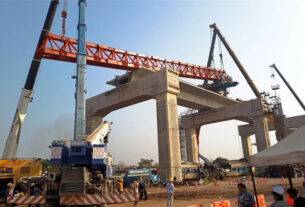PTT Aromatics and Refining (PTTAR) is studying a feasibility to invest in its first olefins cracker worth more than US$1 billion in order to develop benzene – the feedstock for derivatives production which should increase the future revenue.
President and CEO Bowon Vongsinudom yesterday said the study would be concluded by mid of next year so that the company could know the future business direction. If the company decides to invest in the cracker, it will be the major investment in its five-year investment plan (2010-2015).
The company will have to follow the Constitution’s Article 67 (2), which requires upstream and midstream petrochemical projects to conduct the environmental and health impact assessment.
Bowon said PTTAR presently exported half of benzene production. It would like to develop benzene to produce deriviatives to expand the opportunity to increase revenue. In the process to manufacture benzene deriviatives, PTTAR needs propylene to develop benzene to be phenol, bisphenol or cyclohexane in the production process. Thus, it has to establish a cracker, which can produce propylene and ethylene.
Bowon added that even the company had to merge with PTT Chemical (PTTCH), it could not benefit from the company’s cracker as propylene manufactured from PTTCH had already supplied to other aromatics productions in PTT Group.
Besides cracker, the company is still studying to set up a green jet fuel and diesel production worth between $150 million to $200 million. It also plans to increase paraxylene production capacity in the AR2 and AR3 plants by 30,000 tonnes per year and 45,000 tonnes per year, respectively. The investment size for each expansion may not over $100 million.
Bowon said the company expected its revenue this year to exceed Bt200 billion but may not reach Bt250 billion, the highest record in 2008. Its revenue last year was Bt230 billion. He eyes a 10-per cent growth in revenue next year despite the major shutdown of AR1 for 41 days in February. It expects the high spread of paraxylene to help offset the loss revenue from the major shutdown.
He said paraxylene spread was likely to increase continually since this quarter due to increasing demand after cotton price in the world market has sharply increased. Paraxylene spread is currently at $540 per tonne in comparison with $295 in the third quarter of this year, and is likely to continually increase until next year.
Benzene spread is now at $250 per tonne compared with $197 in the previous quarter.

